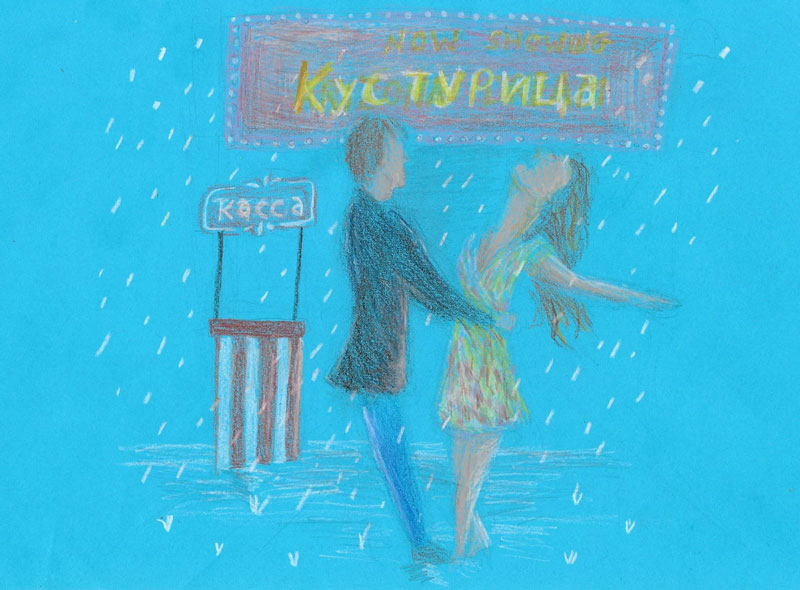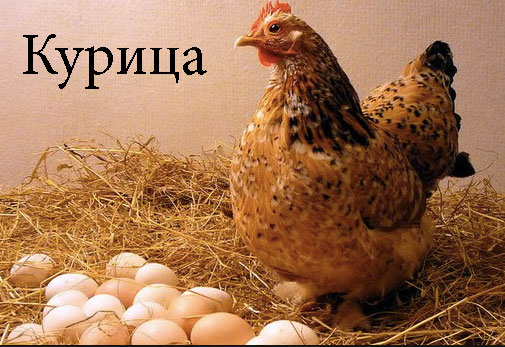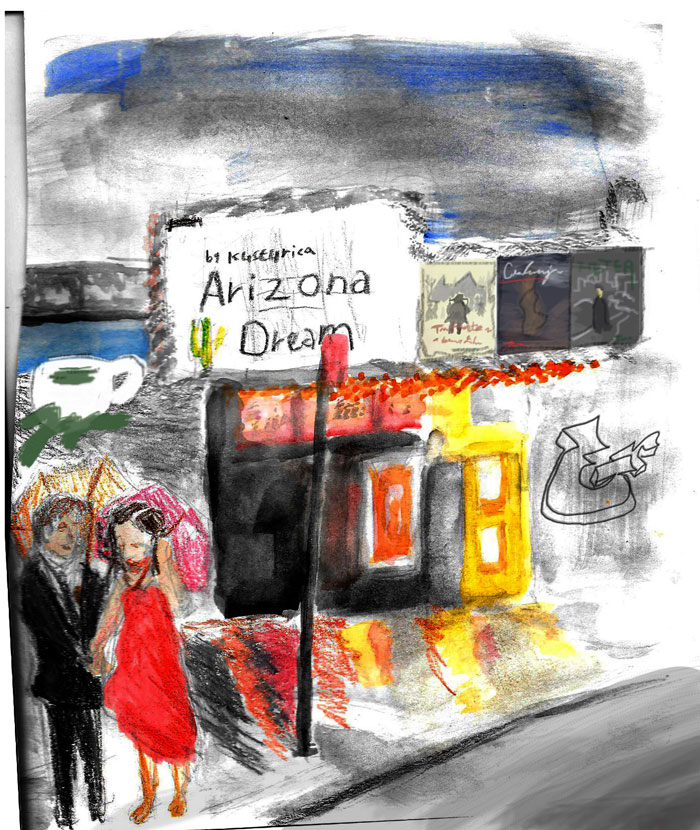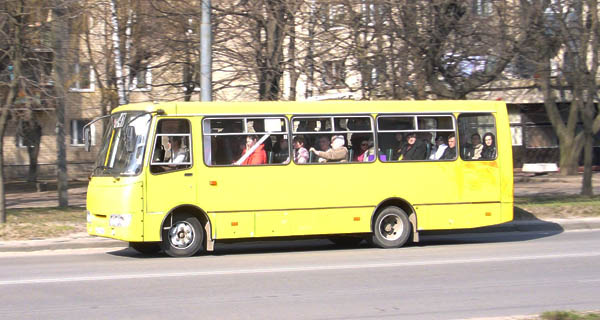Here is a nice song for you guys by the Russian pop-rock band Братья Грим. The song has the name of the famous film director – Кустурица.
Fresh and funny! I’m sure you’ll love it! Please don’t try to rationalise the lyrics too much though. They are a little surreal as you’ll see.
The “Grammar Menu” for today has the preposition по + Dative Case, lots of Instrumental Case, and Plural forms of nouns!
Let’s listen!
Кустурица – The Video
Кустурица – The Lyrics
Волею-неволей
Бегаем по морю
Голыми пятками по небу
Стены, семафоры, серые заборы
Все это мелочи, по фигу
Мокрым поцелуем
Молнии рисуем
И задыхаемся на бегу
Грозы-хулиганы,
Люди-тараканы,
Нам это по фигу, по фигу
Сегодня
И ты после фильма Кустурицы
Шагаешь босиком по улице.
И если никто не простудится,
То все пренепременно сбудется.
И ты словно мокрая курица
Шагаешь босиком по улице.
И если никто не простудится,
То все пренепременно…
Целую неделю
Капают капели
Прямо по темени по фигу
Льется тишина
Мы сошли с ума,
Может быть
Курим сигареты
Только этим летом
Без остановки и на бегу
Хлопаем по лужам
Нам никто не нужен
Нам по фигу, по фигу, по фигу
Сегодня
И ты после фильма Кустурицы
Шагаешь босиком по улице.
И если никто не простудится,
То все пренепременно сбудется.
И ты словно мокрая курица
Шагаешь босиком по улице.
И если никто не простудится,
То все пренепременно…

Кустурица – The Analysis
Волею-неволей бегаем по морю. – With or against our will (whether we want this or not), we are running in the sea.
воля – will
Волею-неволей explains how we’re running: With or against our will.
We most often see the above phrase as Волей-неволей
Волей is the Instrumental form of the word воля. The form волею is also an Instrumental form but a more colloquial/poetic one. You will often see it in lyrics, poetry, etc.
Я это сделал своими руками. – I did this with my own hands (This is an example taken from the previous article on свой).
свои руки → своими руками (Instrumental Case)
Я это сделал своей волей. – I did this with my own will.
своя воля → своей волей (Instrumental Case)
бегать – to run
(бегаю, бегаешь, бегает, бегаем, бегаете, бегают)
The Preposition По
The Preposition по can have different meanings. Let’s explore four common ones:
- along, down a line
Дети бежали по берегу. – The children ran along the shore.
Он шел по улице Пушкина. – He walked down Pushkin street. - around, throughout
Читая книгу, Андрей ходил по комнате. – Andrey was walking around the room reading the book.
Новость быстро разнеслась по всему городу. – The news quickly spread throughout the city. - by a certain means of communication
Они познакомились по Интернету. – They met through over the Internet.
Мы много говорили по телефону вчера. – We spoke a lot on the phone yesterday. - on the surface
Дождь стучал по окнам. – Rain was pattering on the windows.
Он хлопнул друга по спине. – He slapped his friend on the back.
голыми пятками по небу – with “naked heels around the sky”
голая пятка – naked heel → голыми пятками (Instrumental Case) – with naked heels
голый – naked
This phrase gives more information on how they are running. So, altogether they are running:
a) With or without their will.
b) With naked heels around the sky.
The structure is the same and that’s why we use Instrumental Case in both a and b.
Again, we see here another example of the preposition по with the Dative Case.
небо – sky
по небу – around the sky (in different directions)
Стены, семафоры, серые заборы – Walls, semaphores, grey fences.
Pay attention to the change of the stress in the plural form of the following nouns:
стена – wall → стены – walls
сестра – sister → сёстры – sisters
слеза – tear → слёзы – tears
семафор – traffic light → семафоры – traffic lights
серый забор – grey fence → серые заборы – grey fences
серое небо – grey sky
Всё это мелочи, по фигу. – This is all little things we don’t give a s*** about.
мелочь – small thing, little thing, triviality (Synonyms: пустяки, ерунда – we talked about ерунда in this article)
По фигу – I don’t give a s***.
Мне это по фигу. – I don’t give a s***/f*** about this.
Молнии рисуем мокрым поцелуем. – We draw lightings with a wet kiss.
молния – lighting → молнии – lightings
поцелуй – kiss → поцелуи – kisses
мокрый поцелуй → мокрым поцелуем (Instrumental Case)
Рисовать – to draw, illustrate
(рисую, рисуешь, рисует, рисуем, рисуете, рисуют)
As you see рисовать is another verb in -овать which drops the ова in the Present Tense and replaces it with у. Dr. Curtis Ford explains this very well in his YouTube video here.
И задыхаемся на бегу. – And we lose our breath on the run.
задыхаться – to lose one’s breath
задыхаться от любви/ностальгии – to lose one’s breath from love/nostalgia
Remember the preposition от takes Genitive Case. So,
любви – Genitive Case of любовь
ностальгии – Genitive Case of ностальгя
грозы-хулиганы, люди-тараканы – storms – hooligans, people – cockroaches
гроза – storm → грозы – storms (pay attention to the stress)
таракан – cockroach → тараканы – cockroaches
хулиган – hooligan → хулиганы – hooligans
Note: In Russian хулиган is not only a football hooligan but any type of bully.
Нам это по фигу. – We don’t give a s*** about this.
He compares storms to hooligans and people to cockroaches. Both are annoying but who cares about them… 🙂
Сегодня, и ты после фильма Кустурицы, – Today, and after (you watched) the film of Kusturica,
Remember that the preposition после takes Genitive Case!
фильм → фильма (Genitive Case)
We have another Genitive Case here – The film of Kusturica:
Кустурица → Кустурицы
I don’t mean to make fun of the famous Serbian director’s name but his name brings to mind another association… 🙂
Кустурица → Кустурицы (Genitive Case)
курица – chicken → курицы (Genitive Case)

(Ты) шагаешь босиком по улице. – You walk barefoot down the street.
шагать – to walk, make a step
шаг вперед – step forward
шаг назад – step back
Anyone remember the beautiful song Я шагаю по Москве. – I walk around Moscow? We mentioned it in a previous article.
To make another association, you know now what по Москве means: to walk around Moscow (По + Dative Case).
И если никто не простудится, то всё пренепременно сбудется. – And if no one catches a cold, then everything is possible (may happen).
простудиться – to catch a cold
(простужусь, простудишься, простудится, простудимся, простудитесь, простудятся)
непременно – certainly
Note: The prefix пре gives more emphasis to the word непременно which already means certainly. You may hear sometimes очень-преочень – very very very very much!!!!
сбыться – to come true
cбудется – will come true, will happen
И ты словно мокрая курица. – And you are like a “wet chicken”.
There you go, the word chicken appears again…
курица – chicken
словно – like
Note: Мокрая курица is a set phrase meaning “miserable-looking”. Here, it has a more literal meaning as it’s raining and the girl is soaking wet. It’s kind of a word play.
мокрый поцелуй – wet kiss
мокрая курица – wet chicken

Целую неделю капают капели. – During the whole week drops of water are falling.
капель – drop of water that falls from melting ice
Remember that we use Accusative Case to express time (see time expressions here).
целая неделя – whole week → целую неделю – during the whole week (Accusative Case)
Прямо по темени, по фигу. – Right on the top of our heads (the drops are falling), but we don’t care about that.
темя – top of one’s head
We see another use of the Preposition по + Dative Case here: on the surface. For example,
Дождь стучал по окнам. – The rain was pattering on the windows.
окна – windows → окнам (Dative Case)
And to make another association here, the stress changes in Plural for the noun окно – window and becomes окна – windows. Remember the other examples we saw earlier: слеза – слёзы, стена – стены, вода – воды.
Льётся тишина. – Silence is “pouring”.
литься – pour, flow
В этом доме свет льётся со всех сторон. – In this house light is coming through/flowing in from all sides.
A small kid says to his mom:
Мама! У меня льётся кровь! – Mom! I’m bleeding!
Можно подумать, что музыка льётся откуда-то с неба, правда? – It’s possible to think that music is coming down from somewhere in the sky, right? (Георгий Владимов. Большая руда – 1961)
Мы сошли с ума, может быть. – We went crazy probably.
cходить с ума. – to go crazy
A girl says to another girl:
Классный парень у тебя! Девчонки по нему с ума сойдут! – Your boyfriend is awesome! The girls will go crazy about him (when they see him).
Я с ума схожу. – I’ll go crazy.
When someone behaves quite unexpectedly, you can say to him:
Ты что? С ума сошел? Почему это сделал? – What’s the matter with you? Have you gone crazy? Why have you done this?
Курим сигареты. – We are smoking cigarettes.
курить – to smoke
Я много не курю, но всё равно хочу бросить. – I don’t smoke a lot but I still want to quit.
Только этим летом. – Only in this summer (this sounds like a set phrase from advertising – seasonal offers)
Когда? – When?
зимой – in the winter (зима – winter)
весной – in the spring (весна – spring)
летом – in the summer (лето – summer)
осенью – in the autumn (осень – autumn)
Note that all the forms in the left are the Instrumental Case forms of the four seasons on the right.
Без остановки и на бегу. – Without stop and on the run.
остановка – stop
остановка автобуса/трамвая – bus stop/tram stop
Remember that the preposition без takes Genitive Case. Остановки is the Genitive Case of остановка.
Она ждала автобус на остановке. – She was waiting for the bus at the bus stop.
На остановке – at the bus stop (Prepositional Case)
Where was she waiting for the bus? At the bus stop.
Note: When you are on one of those small buses in Russia or Ukraine (маршрутка – small bus) and you want to ask the driver to stop at the next stop you say:
На остановке, пожалуйста or
На следующей (остановке implied)

More nouns that take the preposition на to indicate location?
на остановке – at the bus stop
на работе – at work (работа)
на почте – at the post office (почта)
на вечеринке – at the party (вечеринка)
на рынке – at the market (Be careful! the noun here is masculine → рынок – market)
Хлопаем по лужам – “Clapping on the puddles”
лужа – puddle
хлопать – to clap
This is the 4th meaning of the preposition по + Dative Case that we saw earlier (on the surface – on the puddles).
Нам никто не нужен. – We don’t need anyone.
Нужен - нужна - нужны - нужно
Мне этот словарь очень нужен. – I need this dictionary very much. (We use нужен because it refers to словарь – masculine)
Тебе нужна такая спокойная собака . – You need a quiet dog like this. (We use нужна because it refers to собака – feminine)
Нам нужны билеты в театр. – We need tickets for the theatre. (We use нужны because it refers to билеты – plural)
Что вам нужно? – What do you need? (We use нужно because we don’t know what they need; we ask in general)
Мне нужно отдыхать. – I need to rest. (We use нужно because it refers to отдыхать – infinitive)
никто – no one
Я говорю по русски, но меня никто не понимает! – I speak in Russian but no one understands me!
Нам по фигу, по фигу, по фигу. – We don’t give a s*** about anything.

amazing..i hope you do other songs
and thank you very much that was very helpfull
Thank you very much! Yes, more songs are coming! 🙂
So complete descriptions and reviews!
Thanks Пауло!
These analyses are superb. They enable us to break down and understand aspects of Russian, whether they be grammatical constructions or colloquialisms, in the “real” emotional context of a song (or film clip in other instances). Well done, Angelos, and keep up the good work – if you have time!
Thanks Stephen! Learning in context is always fun, isn’t it? If you have any questions, please let me know. Have a great day!